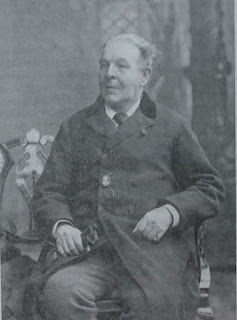There was a terrible tragedy in Walton in 1887 when a mother killed three of her young children during a bout of insanity.
On 7th June 1887 Edward Anthony left his home at 62 Wyatt Street, off Fountains Road in Walton, to go to work as a petty officer on board the Cunard steamer Samaria. He left behind his wife Mary, their three young children, as well as his seventeen year old son Edward from a former marriage.
In the early afternoon Margaret, Mary's thirteen year old daughter from an earlier marriage who worked as a nursemaid, returned home. Edward was having his dinner in the kitchen and heard his step sister shout 'Oh mother what have you done.' On going to see what was wrong Edward saw that two of the children, seven month old Mary Ellen and two year old Annie were dead. Their throats had been cut, and laid out as if for burial while three year old Alfred was in his mother's arms and barely alive. Mary was covered in blood and replied with a vacant tone 'You can see what I have done, I will do the same to myself, your father will come back drowned.' It was believed this referred to Mary being worried about her husband having an injured eye and not wanting him to work that day.
Neighbours were called for help and Alfred was rushed to Stanley hospital. A police constable took Mary into custody and she said to him 'I did it, and if they left me a little longer I would have done it to myself as well.' She was taken to the Westminster Road bridewell and said that she had given the children laudanum to quieten them down before slitting their throats.
 The following day the death toll rose to three when Alfred died from his injuries. Mary was charged with murder and appeared before the stipendiary magistrate Mr Raffles. The Liverpool Mercury reported that Mary was forty one years old, was short in stature and of weakly appearance. Edward was her third husband and she had a total of eleven children. Neighbours described her as an affectionate mother, who lived on the best terms with her husband in a house of cleanliness and comfort.
The following day the death toll rose to three when Alfred died from his injuries. Mary was charged with murder and appeared before the stipendiary magistrate Mr Raffles. The Liverpool Mercury reported that Mary was forty one years old, was short in stature and of weakly appearance. Edward was her third husband and she had a total of eleven children. Neighbours described her as an affectionate mother, who lived on the best terms with her husband in a house of cleanliness and comfort.
An inquest on 9th June before coroner Clarke Aspinall returned a verdict of wilful murder after he told the jury it was the only one that could be returned. Mary was then committed for trial at the nest assizes.
The funeral of the three victims took place on 12th June. The courtege, containing a hearse and three coaches, left at 8am and a crowd of 10,000 was estimated to have gathered in Walton Road. After a service at the chapel in Kirkdale cemetery, there were heartbreaking scenes as the three coffins were lowered into the ground. The tiniest, containing the body of baby Mary Ellen was borne by half sisters Margaret and eleven year old Jamesina.
 On 4th August Mary appeared before Mr Justice Day, where she was allowed to sit in the dock and provided tea by a wardress. Mary's stepson Edward confirmed that she had always been a good mother to him and the other children, and that she had been complaining of a sore head around the time. Daughter Margaret said her mother looked out of her mind with her hair hanging on her face and blood on her hands.
On 4th August Mary appeared before Mr Justice Day, where she was allowed to sit in the dock and provided tea by a wardress. Mary's stepson Edward confirmed that she had always been a good mother to him and the other children, and that she had been complaining of a sore head around the time. Daughter Margaret said her mother looked out of her mind with her hair hanging on her face and blood on her hands.
Dr Rogers from the Rainhill Asylum said that he was of no doubt that Mary was of unsound mind at the time of the killings. It was disclosed that Mary had endured a rambling state of mind two years earlier and was taken to a doctor by her husband. The prosecution also had established that there was a history of insanity in Mary's family, her aunt having been in an asylum and although now released, continuing to act in a 'peculiar manner.'
In addressing the jury for Mary her solicitor Mr Shee said that she had been a good mother and the evidence pointed towards insanity. They only needed to consult for a short time before returning a verdict that Mary was guilty of murder but insane at the time. Justice Day ordered that she be detained during Her Majesty's pleasure and as she was taken from the dock, Mary wept bitterly.


No comments:
Post a Comment